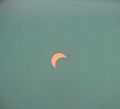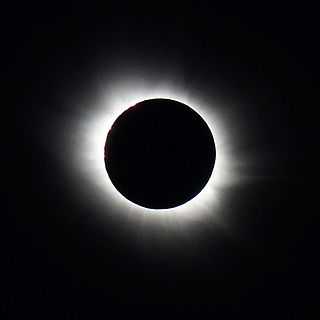Solar eclipse of November 3, 2013
| Solar eclipse of November 3, 2013 | |
|---|---|
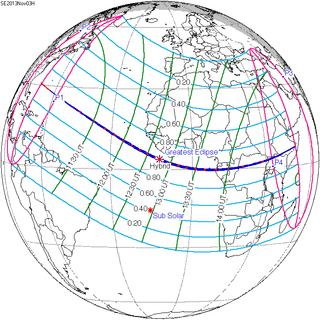 Map | |
| Type of eclipse | |
| Nature | Hybrid |
| Gamma | 0.3272 |
| Magnitude | 1.0159 |
| Maximum eclipse | |
| Duration | 100 sec (1 m 40 s) |
| Coordinates | 3°30′N 11°42′W / 3.5°N 11.7°W |
| Max. width of band | 58 km (36 mi) |
| Times (UTC) | |
| (P1) Partial begin | 10:04:34 |
| (U1) Total begin | 11:05:17 |
| Greatest eclipse | 12:47:36 |
| (U4) Total end | 14:27:42 |
| (P4) Partial end | 15:28:21 |
| References | |
| Saros | 143 (23 of 72) |
| Catalog # (SE5000) | 9538 |
A total solar eclipse occurred on 3 November 2013. It was a hybrid eclipse of the Sun with a magnitude of 1.0159, with a small portion over the western atlantic ocean at sunrise as an annular eclipse, and the rest is a narrow total solar eclipse.
Viewing
Totality was visible from the northern Atlantic Ocean (east of Florida) to Africa (Gabon (landfall), R. Congo, DR Congo, Uganda, South Sudan, Kenya, Ethiopia, Somalia), with maximum of 1 minute and 39 seconds visible from the Atlantic Ocean south of Ivory Coast and Ghana.[1]
Places with partial darkening were the Eastern coast of North America, southern Greenland, Bermuda, the Caribbean islands, Costa Rica, Panama, Northern South America, almost all the African continent, the Iberian Peninsula, Italy, Greece, Malta, Southern Russia, the Caucasus, Turkey and the Middle East.
This solar eclipse happened simultaneously with the 2013 Abu Dhabi Grand Prix, and it was possible to observe a partial solar eclipse in Abu Dhabi before the sunset while the F1 race took place, as shown briefly during its broadcast.
Photo gallery
| Wikimedia Commons has media related to Solar eclipse of 2013 November 3. |
-

The extent of the solar eclipse on November 3, 2013 at 11:03:04 UTC as seen from New York City, USA
-
The extent of the solar eclipse on 2013-11-03 at 13:42 UTC as seen from Libreville, Gabon.
Related eclipses
Solar eclipses 2011–2014
Each member in a semester series of solar eclipses repeats approximately every 177 days and 4 hours (a semester) at alternating nodes of the Moon's orbit.
Note: Partial solar eclipses on January 4, 2011, and July 1, 2011, occur in the previous semester series.
| Descending node | Ascending node | |||
|---|---|---|---|---|
| Saros | Map | Saros | Map | |
| 118 | June 1, 2011 Partial |
123 | November 25, 2011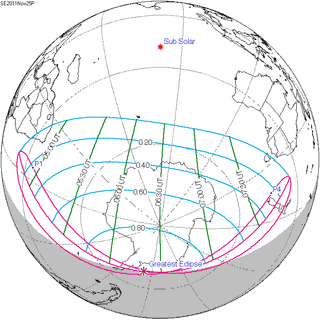 Partial | |
128 Middlegate, Nevada |
May 20, 2012 Annular |
133 Ellis Beach, Queensland |
November 13, 2012 Total | |
| 138 Renner Springs, Australia |
May 10, 2013 Annular |
143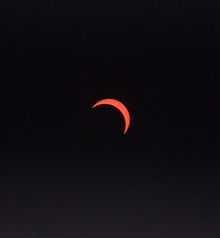 Partial from Accra, Ghana |
November 3, 2013 Hybrid | |
| 148 | April 29, 2014 Annular |
153 Partial from Minneapolis, Minnesota |
October 23, 2014 Partial | |
Saros 143
It is a part of Saros cycle 143, repeating every 18 years, 11 days, containing 72 events. The series started with partial solar eclipse on March 7, 1617 and total event from June 24, 1797 through October 24, 1995. It has hybrid eclipses from November 3, 2013 through December 6, 2067, and annular eclipses from December 16, 2085 through September 16, 2536. The series ends at member 72 as a partial eclipse on April 23, 2873. The longest duration of totality was 3 minutes, 50 seconds on August 19, 1887.[2]
Series members 17-28 occur between 1901 and 2100:
| 17 | 18 | 19 |
|---|---|---|
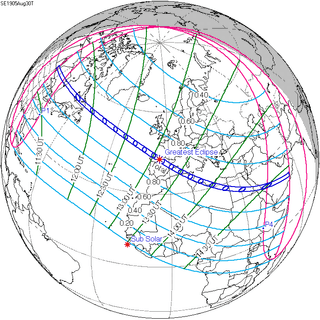 August 30, 1905 |
 September 10, 1923 |
 September 21, 1941 |
| 20 | 21 | 22 |
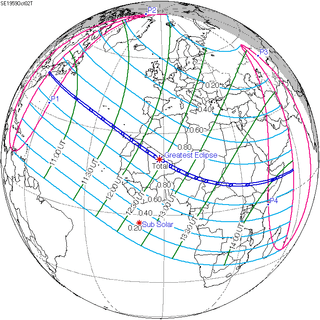 October 2, 1959 |
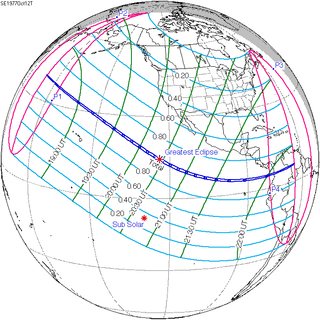 October 12, 1977 |
 October 24, 1995 |
| 23 | 24 | 25 |
 November 3, 2013 |
 November 14, 2031 |
 November 25, 2049 |
| 26 | 27 | 28 |
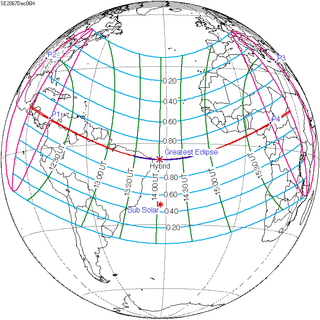 December 6, 2067 |
 December 16, 2085 |
Metonic series
The metonic series repeats eclipses every 19 years (6939.69 days), lasting about 5 cycles. Eclipses occur in nearly the same calendar date. In addition the octon subseries repeats 1/5 of that or every 3.8 years (1387.94 days).
This series has 20 eclipse events between June 10, 1964 and August 21, 2036.
| June 10–11 | March 27–29 | January 15–16 | November 3 | August 21–22 |
|---|---|---|---|---|
| 117 | 119 | 121 | 123 | 125 |
 June 10, 1964 |
 March 28, 1968 |
 January 16, 1972 |
 November 3, 1975 |
 August 22, 1979 |
| 127 | 129 | 131 | 133 | 135 |
 June 11, 1983 |
 March 29, 1987 |
 January 15, 1991 |
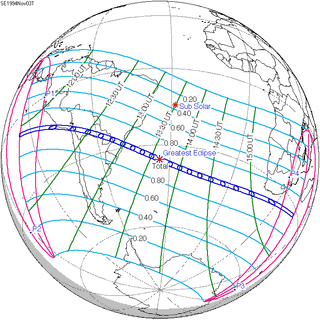 November 3, 1994 |
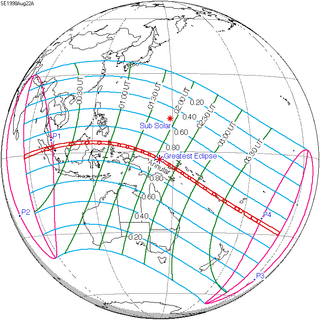 August 22, 1998 |
| 137 | 139 | 141 | 143 | 145 |
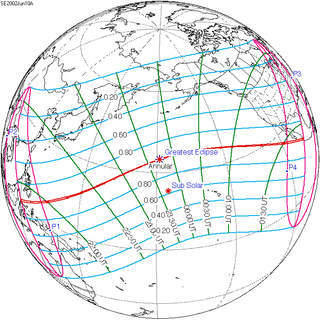 June 10, 2002 |
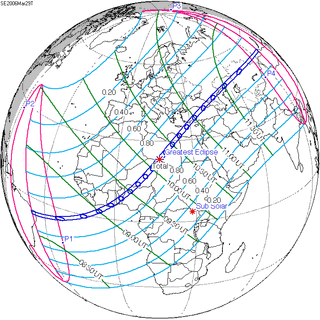 March 29, 2006 |
 January 15, 2010 |
 November 3, 2013 |
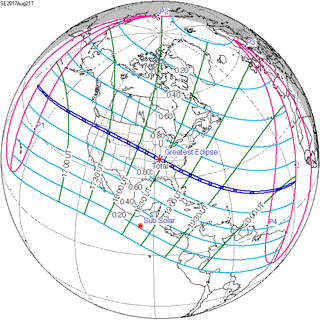 August 21, 2017 |
| 147 | 149 | 151 | 153 | 155 |
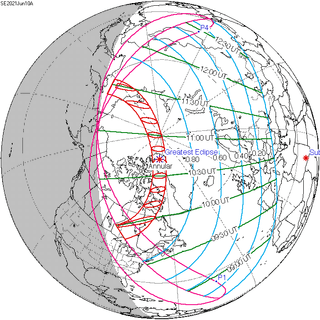 June 10, 2021 |
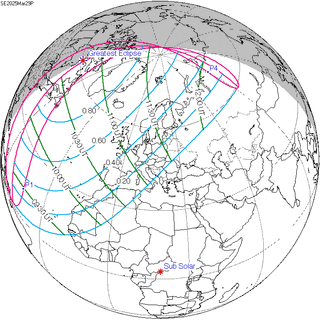 March 29, 2025 |
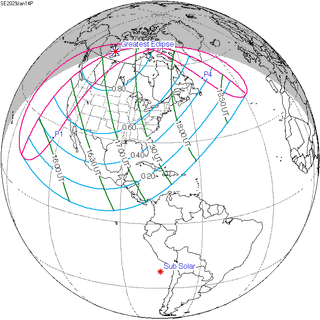 January 14, 2029 |
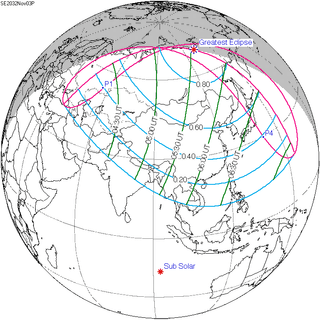 November 3, 2032 |
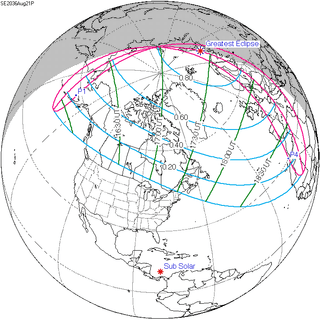 August 21, 2036 |
Notes
References
- Earth visibility chart and eclipse statistics Eclipse Predictions by Fred Espenak, NASA/GSFC
